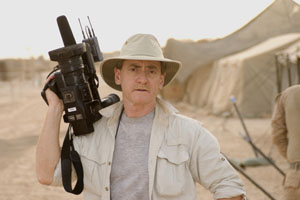Communications
Q&A with Professor Bill Gentile

American University professor Bill Gentile is a noted pioneer of "backpack journalism" and has four decades of field experience as an independent journalist and documentary filmmaker.
Working for United Press International he covered the 1979 Sandinista Revolution in Nicaragua; the U.S.-backed Contra War in Nicaragua and the Salvadoran Civil War in the 1980s; the U.S. invasion of Panama; the 1994 invasion of Haiti, the ongoing conflict with Cuba; the 1990-91 Persian Gulf War and the subsequent war in Iraq and Afghanistan. He produced and shot Afghanistan: The Forgotten War, which was broadcast by NOW on PBS and earned him a national Emmy Award nomination. He shot, produced and wrote the 2015 documentary, "Afghan Dreams," about four Afghan law students -all female -who defy all odds to compete in the world's most important competition of international commercial law.
On your website you have the statements: This I believe. This I practice. This I teach. What do you mean by them, and how did you to arrive at this place professionally?
The methodology that we refer to as "backpack journalism" poses somewhat of a challenge to the standard practices of our field. The notion that one person can be journalist, cameraperson, sound person, producer, writer, editor and narrator all in one, can be perceived not only as a challenge -- but as a threat. I have had the great good fortune of being one of the pioneers of the craft, which I have defended against some of its critics. So when I say, "This I believe. This I practice. This I teach," I am making a case for the methodology itself and declaring that I can back up my words with my actions, and that I can pass on the craft to those who want to do the same.
What has been your favorite and most challenging project or assignment that you have worked on?
My film, "Through Their Eyes," about a handful of AU students studying abroad in Cuba during Fall 2011 was one of the most challenging in terms of the amount of work in sometimes difficult circumstances. It also has been one of the most gratifying in terms of the final product.
Was there ever a time during a project or filming that a moment was too potent and you may have pulled back from capturing it?
I was on assignment in a hospital once and had been ordered to video the removal of a deceased fetus from the womb of a woman whose child had died at a relatively advanced stage of pregnancy. I decided that this would have been an unforgivable intrusion into a painful chapter in the woman's life and I refused to do it. I believe there are some things that should remain private.
Why is backpack journalism important for American University to teach?
The visual storytelling language is the language of the future. The print language used in newspapers and magazines, for example, will never be replaced by the visual language but, for a number of reasons, the visual language increasingly permeates every form of communication and every professional field. The Backpack Journalism Project is essential because it teaches students from across the university and across disciplines, how to speak a language that is universal and that everyone can understand. The long-term objective is to make American University THE place to student backpack journalism, and the visual storytelling language.
What challenges do storytelling, photojournalism face given the changes and threats on journalism?
The visual storytelling language, photojournalism and backpack video journalism will thrive despite challenges posed by those who would prefer to control their behavior and their message. And this is because freedom of expression eventually trumps the suppression of freedom. And it is our collective responsibility to make sure that is the case.